-
A PARIS EDUCATION/MES PROVINCIALES (Jean-Paul Civeyrac 2018)
JEAN-PAUL CIVEYRAC: A PARIS EDUCATION/MES PROVINCIALES (2018)
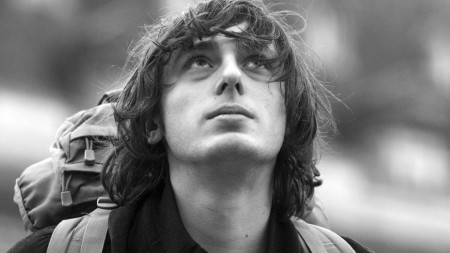
ADRANIC MANET IN A PARIS EDUCATION/MES PROVINCIALES
Absorbing, touching portrait of a young man from the provinces in Paris film school
A Paris Education/Mes provinciales, if not for everyone, is a cinephile's and a French film fan's delight. As others have said, it's worthy of the tradition of Jean Eustache’s The Mother and the Whore and Philippe Garrel’s Regular Lovers - or some of Garrel's earlier films. Its politics among rival arts students strongly reminded me of Emmanuel Bourdieu's Poison Friends/Les amitiés maléfiques (NYFF 2006), particularly for parallels between two seductive, dominant, dangerous, and doomed central characters. The style and the themes here are so classic Civeyrac takes pains in a very early scene to refer to the candidate, Emmanuel Macron, to show this is happening right now.
In A Paris Education/Mes provinciales Étienne (Adrianic Manet), is a long-haired, movie-mad young man of limited means but unlimited enthusiasm (though not without a healthy dose of self-doubt) who comes to the capital from the provinces, specifically working-class Lyon, to live the student life, French style, in film school. The film itself has an evocative "French movie" style, in widescreen black and white, scored with a lot of Bach like a film of the Nouvelle Vague.
More than about love affairs or fledgling filmmakers, this is about that most French of activities, smoking and arguing. Ideas fly, and you actually pay attention to them. They are not mere decor to flesh out relationships and love affairs, but the cinematic equivalent of an intellectual bildungsroman. The French title itself, Provinciales, while alluding to the fact that Étienne and his closest friends are all from provincial French cities, Lyon, Rheims, etc., is an allusion to a book by Pascal that Étienne, who majored in Philosophy back home and studied the Pensées, has not read, and now wants to.
Adrianic Manet is larger and blowsier than your usual young French star, big, long-legged, high-mounted, a bit like the young Depardieu, with a soft face that the camera loves enough to survive many tight closeups. He and his hometown girlfriend Lucie (Diane Rouxel) have been a couple for six years, a long, long time, and they pledge eternal loyalty - until absence makes the heart wander, especially in Étienne's case. He is a bit of a cocksman, with young ladies in and out of his room in the group flat faster than we can count. Notable early on is Valentina (Jenna Thiam), who is soon moving to Berlin, and is very vivacious and attractive - and interested.
But at this point Étienne is trying to be faithful to Lucie, and he and Valentina part without a connection. The most important is Annabelle (Sophie Verbeeck), stronger minded and more moral than Étienne or his friends, a social activist who questions whether making films is enough of a contribution to the world. Eventually Annabelle becomes more fascinating to Étienne than any of the other young women. But that relationship will go astray like the others, only more painfully and memorably. The woman he will wind up with as a couple will come from left field, not a fellow student, someone he barely knew at first from a job.
The young man who impresses and bothers the other film students is the super-confident Mathias (Corentin Fila, who had a central role in Téchiné's Being 17, and an original, unexpected choice for this role). He is very similar to Poison Friends' Thibault Vinçon (André Morney). Matias is a young man who seems brilliant and to whom both Étienne and his gay fellow film student pal Jean-Noël (Gonzague Van Bervesseles) are strongly drawn, and whom all admire or detest, but whose spirit and energy and compelling snap judgments wind up being more destructive than helpful. Like Thibault Vinçon, Mathias is mysterious, and somehow illusory. Étienne worships the elusive Mathias and considers him a key friend, even though he often disappears inexplicably, and his comments cause Étienne to destroy his first short film, begun in Lyon, more than a year's work.
Jean-Noël is the opposite of Mathias, mild-mannered, supportive of all his classmates' filmmaking, and a willing collaborator who's a little in love with Étienne, and doubtless with the sexy, vivacious Mathias as well. Étienne will lose Jean-Noël as a friend because he thoughtlessly treats him as a shadow helper rather than a partner in his work. He suffers major losses just when he is beginning his second short film, showing filmmaking is a collaborative effort but also one that suffers many vicissitudes.
The "faults" of this delightful and moving film are two. How can we keep track of all these young people, all these debates, all these changes of fortune? In being realistically comprehensive, Civeyrac loses artistic unity and clear focus. Second, the related flaw: his film is too long. One could end it any moment in the last twenty minutes. But it's to its credit that these moments all have enough meaning and weight to end with them.
A Paris Education was reviewed at its Berlin debut in Hollywood Reporter by Jordan Mintzer. He says this doesn't avoid being more realistic, not the "whiny French film" one of the film students calls for, but it's no less compelling for that, and in it Civeyrac definitely finds his "voice" - at 53, after eight features - making this time "a sincere and very specific kind of coming-of-age tale that’s anchored in the performances of a committed young cast, many of them relatively unknown."
It is hard for me to place A Paris Education in Civeyrac's oeuvre, after having seen and reviewed only two of the previous eight. The first was Through the Forest,, his sixth, from 2005, seen in my first New York Film Festival that year, a short, glamorous, dream-like fable that I found felt "tantalizing and incomplete." The second was My Friend Victoria (R-V 2015), an engaging and glossy, sophisticated but more mainstream family study based on a Doris Lessing story.
One is left by Mintzer's review with the question: can a filmmaker be "finding himself" with feature film number nine? But if he is in that process at 53, and still teaching as he was in 2006 at the national film school La Fémis, that makes his involvement in these young men struggling with the beauties and challenges of cinema all the more moving and germane.
A Paris Education/Mes provinciales, 137 mins., debuted Jan. 2018 in the Panorama section of the Berlinale It opens in French cinemas 18 Apr. 2018. Screened for this review as part of the March 8-18 2018 edition of the joint UniFrance, Film Society of Lincoln Center series, Rendez-Vous with French Cinema.
Showtimes:
March 12 3:30 PM
March 17 6:00 PM
Last edited by Chris Knipp; 09-07-2018 at 01:44 PM.
-
ORCHESTRA CLASS/LA MÉLODIE (Rachid Hami 2017)
RACHID HAMI: ORCHESTRA CLASS/LA MÉLODIE (2017
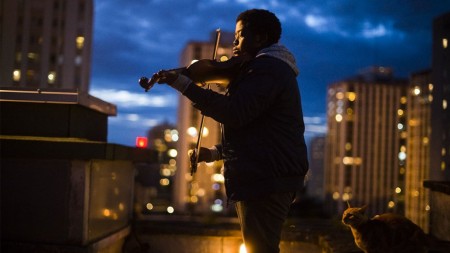
ALFRED RENELY IN ORCHESTRA CLASS
The heart is warmed by kids learning violin
French movies aren't by any means always original or challenging. Here is one that fits in a familiar mode but just does the same thing over again - in French. It's a low-keyed, enjoyable little story we have heard in other forms before.
Popular French comic Kad Merad, of Danny Boon's super-successful 2008 movie comedy Welcome to the Sticks/Bienvenue chez les Ch'tis, takes on a more serious role here. He is Simon Daoud, a violinist hired to teach a special class in a Paris ghetto middle school to learn the violin well enough to play Rimsky-Korsakov's "Scheherazade" at a public concert later in the year. They go from awful to implausibly good. We are touched. It's conventional but it works.
Boyd van Hoeij of Hollywood Reporter sums up the result in his review written at Venice: "A sullen French-Algerian violinist tries to tame a rowdy Parisian class of immigrant and second-generation immigrant kids so he can teach them how to play the fiddle in La Melodie. For those who have seen Sergio Machado’s 2015 title The Violin Teacher, shot in the shantytowns of São Paulo, or, before that, Wes Craven’s East Harlem-set Music of the Heart with Meryl Streep, this will be an all-too-familiar tale — except that it’s now in French. Indeed, for much of the film’s running time, actor-turned-director Rachid Hami doesn’t seem interested in reinventing the wheel of the inspiring-music-teacher genre, which makes this unfussily assembled feature the cinematic equivalent of a pretty comfortable but also rather everyday sweater."
There you have it. This is a movie genre, the heartwarming tale of ghetto kids tamed by classical music. It is surprising how glum comic Kad Merad is here, but he has a silence and a stillness and a propriety and reserve that are dramatically effective and all very French. Merad has an amazing presence. It's natural and innate, as is the equally strong presence of the kids, black, Arab, and white, whom Hami, a ghetto kid himself discovered for Kechiche's 2003Games of Love and Chance/L'Esquive, said he found "on the streets." There is a scene in a restaurant when one skinny black kid riffs and disses and the others answer back that is priceless: these kids play off each other naturally and fast.
The movie has a central player Arnold (Alfred Renely), who cheats and fights to get into the violin class: it is his dream, and he is gifted and has a passion. His friend (sometimes) Samir (Zakaria-Tayeb Lazab) enters the story when his father (the grizzled Slimane Dazi of Audiard's A Prophet) pulls him out, and M. Daud visits his family and talks him out of that. His playing for them as a sample of violin music of a passage from Bach's suites for unaccompanied violin that is one of the most powerful moments in all of western classical music is powerful persuasion. Here as elsewhere this movie makes good use of closeups of tearful faces.
Orchestra Class/Le mélodie, 102 mins., debuted at Venice Sept. 2017; showed at a handful of other international festivals. Opened in French cinemas 8 Nov. 2017, also in Germany, Colombia and Mexico. Mediocre-to-poor French reviews, AlloCine 2.9. Screened for this review as part of the New York Unifrance-FSLC Rendez-Vous with French Cinema, 14 Mar. 2018.
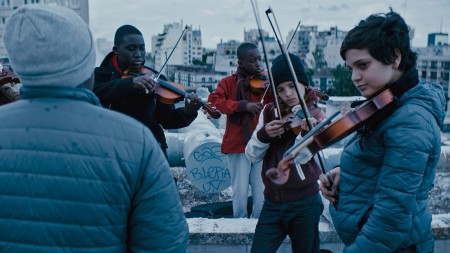
Last edited by Chris Knipp; 03-15-2018 at 06:35 AM.
-
ENDANGERED SPECIES/ESPÈCES MENACÉES (Gilles Bourdos 2017)
GILLES BOURDOS: ENDANGERED SPECIES/LES ESPÈCES MENACÉES (2017)
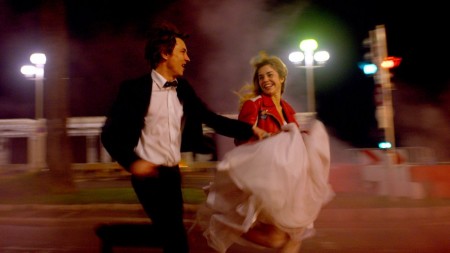
VINCENT ROTTIERS AND ALICE ISAAZ IN ENDANGERED SPECIES
Relationships, good and bad
It may seem callous to find fun in a series of personal disasters, but it may be the only way to survive a movie like Gilles Bourdos' Endangered Species/Espèces menacés.
The director of the arthouse bonbon Renoir tries something more ambitious in this, one where he seems to have been injected with a dose of Paul Thomas Anderson's Magnolia. This omnibus mashup of three Richard Bausch short stories doesn't have that movie's emotional resonance and depth of characterization, or for that matter its narrative complexity. But it's a rip-snorting, wild collection of somewhat intertwining storylines that keeps you watching, jaw dropped.
We begin with a wedding night that goes memorably wrong. The young husband Tomas (Vincent Rottiers), who turns out to be a tree-trimmer, is covered with tattoos that make him look like a gangster. His behavior is strangely menacing and unfriendly. The bride Josephine (Alice Isaaz) is troubled. But she will turn out to be trapped in a hopeless addiction to a violent, abusive relationship. Rottiers is masterful at depicting a kind of madness that is more threatening because of his cleancut, mild appearance. Mélanie's parents will clash over this, and her father will pursue justice in his own way that takes us into thriller-horror territory.
We also have: a mad woman, perhaps driven bonkers by her husband's disloyalty whose tall, virginal, Ph.D student son who juggles may be a bit mad too. There is Mélanie (Alice de Lencquesaing), a 23-year-old woman who enrages her father Vincent (Eric Elmosnino) with her telephone announcement that she's marrying Yann Peterson (Carlo Brandt), a professor, a man of 63, 18 years older than him, by whom she is pregnant. Josephine, the menaced young bride, turns out to be Vincent's new neighbor, and the virginal young Ph.D. student turns out to be Yann Peterson's advisee. Et voilà! It all makes sense, doesn't it?
Hollywood Reporter's Boyd van Hoeij, writing from the film's debut at Venice, describes the film's storyline, structure, and strong and weak points in more detail.
This is a film of virtuoso skill, both in the editing - we can follow all the plotlines clearly - and in the acting. It may arguably turn reality TV plotlines into arias, as Magnolia certainly does. But it reads as a trick. Its showing off amuses rather than moves. It's a game well played. No more. But that's plenty on some days.
Endangered Species/Espèces menacés, 115 mins., debuted at Venice Sept. 2017; also shown at Helsinki and Taipei festivals, and opened in France 27 Sept. with mixed reviews (AlloCiné press rating 3.2).
Last edited by Chris Knipp; 03-17-2018 at 06:48 PM.
-
A MEMOIR OF WAR/LA DOULEUR (Emmanuel Finkiel 2017)
EMMANUEL FINKIEL: A MEMOIR OF WAR/LA DOULEUR (2017)
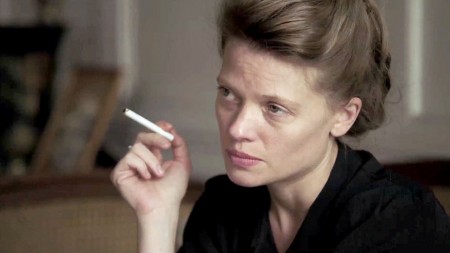
MÉLANIE THIERRY IN LA DOULEUR
Reliving Marguerite Duras' unbearable wait
"A Memoir of War" is a pretty limp version of the title of Marguerite Duras' typically obsessive, poetic memoir of the trauma of her Resistance husband's arrest during the last years of the War. The real title, an unforgettable one, is La douleur - Pain - and it rings out like a muffled scream. Emmanuel Finkiel has made an elegant, simple, yet stylized film version, presumably to introduce a younger generation to the book, and perhaps the writer. Duras' name is on many films for the writing, most famously Resnais' Hiroshima mon amour, which is a more important film and a better expression of the author's unique style.
There are moments when the haunting, repetitive style comes out in the new movie. There are also times when Marguerite (Mélanie Thierry) reappears twice in the same room, and the camera shifts to the second figure of her - perhaps a visual objective correlative for the repeated refrains.
Finkiel's film is simple, elegant, yet harrowing through its sheer length (127 minutes). It is also shot in extreme closeups, leading Cahiers du Cinéma's reviewer to claim - not without reason - that its model is the Hungarian Auschwitz monodrama, Son of Saul, or that the viewer makes a fuzzy re-edit of the two films into each other as she watches, a cannibalizing formalism turning Robert Antelme (Duras' Resistance husband taken away by the Nazis) into the hero of Son of Saul and nullifying both films. This conceit from Stéphane Delorme, Cahiers'critic, points to something we need to recognize. Finkiel's La douleur is a popularization, but also a formally very stylized one. One is never unaware of its visual gestures, its consistent look.
This is an emotionally complex as well as exhausting story but also a simple one, with only three characters: Marguerite; Pierre Rabier (Benoît Magimel), the collaborator obsessed with her; and Dionys Mascolo (Benjamin Biolay), her husband's best friend. The two men are torments and foils for Marguerite. The whole process of obsessively pursuing news of her missing husband is saved from pure insanity by Marguerite's playing off the two men. Rabier is richly embodied by Benoît Magimel, who has grown blowsy and overweight, his face sensuous and dull, a façade we can't see past, and this is perfect because he is not quite real. This, as Delorme understood, is like Son of Saul a monodrama, and much of the action is going on purely in Marguerite's, the writer Duras', head, and, of course, the film is dominated by her, Thierry's voiceover.
Thierry, at least for me, is the real surprise. Though it was far from her first appearance - she was in a number of TV films - she first drew attention as the titular Princess of Montpensier, well-served by the venerable and reliable Bertrand Tavernier, but a pretty young thing in a somewhat superficial movie (though it got her the "Meilleur espoir féminin" César), who began as an early school dropout to be in ads and do modeling. Who would expect her to be as weathered and war-weary, at only 37? It must be credited to dedication, and smoking a lot of cigarettes, as everybody does to excess in this film, even for French people. Joking aside, the bloom of girlish prettiness is off Thierry now, and she's ripe for serious roles from now on.
This adaptation of Duras' autobiographical novel is made more specific here, naming actual names not mentioned by Duras. Here are the details. It's June 1944, and France is still under the German occupation. The writer and communist Robert Antelme, a major figure of the Resistance, is arrested and deported. His young wife Marguerite Duras, writer and resistant, is torn by the anguish of not having news of him and her secret affair with her comrade Dionys. She meets a French agent working at the Gestapo, Pierre Rabier, and, ready to do anything to find her husband, puts himself to the test of an ambiguous relationship with this troubled man, only to be able to help him. The end of the war and the return of the camps announce to Marguerite Duras the beginning of an unbearable wait, a slow and silent agony in the midst of the chaos of the Liberation of Paris. And the happy ending is perhaps not so happy, or a real ending.
You can play this over and over and over in your mind, to understand it. You can read the book, preferably in French, and you can rewatch this film, which deserves our respect and is, properly, respectful toward its autobiographical novel source while judiciously avoiding hagiography. Highly recommended.
The spare, angst-ridden score, evoking musique concrète, is by Nicolas Becker. The cinematographer is Alexis Kavyrchine.
See Guy Lodge's more detailed review for Variety.
A Memoir of War/La douleur, 127 mins., debuted at Angoulême Aug. 2017; three other listed festivals. Theatrically released in France 24 Jan. 2018 to raves from critics (AlloCiné press rating 4.0). Screened for this review at the Unifrance-Film Society of Lincoln Center 2018 New York Rendez-Vous with French Cinema.
Last edited by Chris Knipp; 03-17-2018 at 09:05 PM.
-
12 DAYS/12 JOURS (Raymond Depardon 2017)
RAYMOND DEPARDON: 12 DAYS/12 JOURS (2017)
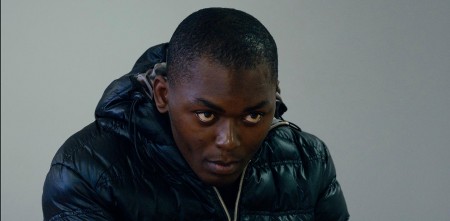
Law and mental illness in France examined at a key choke point
By French law, anyone admitted into the hospital without their consent must be seen by a judge within 12 days. That judge must decide whether these psychiatric hospital patients can be allowed back into society. As Richard Brody of The New Yorker puts it, Depardon "sees the hearing room as a distorting mirror for civic life at large." The patients mostly request to be released, and it is not granted. Some of the patient-victims seem simply to have fallen through the cracks, and on the face of it to be no more crazy than many who live free. And this is troubling if not enraging. An important subject, but the film is repetitious and limited, and the famous documentarian Depardon might have found a more revealing, more complete, approach. This is what one sometimes feels with the exhaustive, exhausting, and ultimately hypnotic American documentaries of Frederick Wiseman. He tortures us with a selfless thoroughness that is in fact stylized limitation.
12 Days/12 jours, 82 min., debuted at Cannes May 2017; ten other festivals. Screened for this review as part of the Mar. 2018 Rendez-Vous with French Cinema at Lincoln Center, New York. The film has a continuing run at Anthology Film Archives.

Raymond Depardon after screening
Last edited by Chris Knipp; 04-24-2018 at 12:05 PM.
-
WAITING FOR THE BARBARIANS (Eugène Green 2017)
EUGÈNE GREEN: WAITING FOR THE BARBARIANS/EN ATTENDANT LES BARBARES (2017)
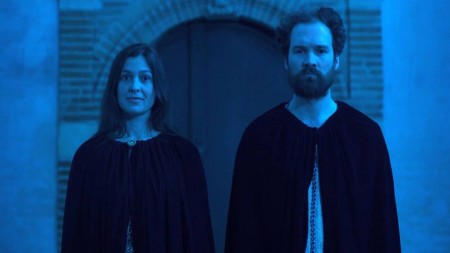
An elegantly formal workshop film from Eugène Green
The film is the offshoot of an evening workshop in Toulouse April-May 2017 led by Green. It was reported on in Cineropa by Alfonso Rivera, who described it as a "daring" experiment. He did not simply film the workshop but went about a plan to make a film that uses images of Toulouse. He wrote a screenplay, brought his usual dp by Raphaël O'Byrne and a sound engineer, chose 12 actors from 35 candidates. But the result will not appeal to everybody. Some will find it too stylized, its archness alienating. Richard Brody of The New Yorker, however, has good things to say about it both in a piece on "the must-see films of the Rendez-Vous with French Cinema" (including also Bruno Dumont's musical Joan of Arc beach movie and one about three Iranians, two thin and one very overweight); and his short review for the magazine's front section movies listings.
Anyone who has carefully watched Green's previous feature, Son of Joseph (NYFF 2016) will find many similarities. There is the expressed distaste for modern digital devices, shown here in the confuscating of the cell phones of all the multi-identity players when they come to the chateau (except for the "SDF" or homeless person, who has none), and the implied mockery of "bobos," or bourgeois (rich) bohemians (or pseudo bohemians) whom Joseph and Vincent in Son of Joseph both agree they "detest." Green has long tended to consider Americans uncouth, and one of the barbarian groups feared by the reuge-takers in the film are "United Statians."
Also carrying over from the previous film is Bressonian dialogue, meaning speaking very slowly (in Green's case archaically using all he liaisons), framed front and center and staring into the camera when speaking. Green also repeats some of the same verbal jokes, like giving feminine forms of French nouns that don't exist, like "auteurse," and the joke that a female bobo is a "bobine." There is something engagingly lame about these, but they are also one of the things that will turn off viewers or leave them indifferent, and Green sometimes sounds like an amiable but incorrigible curmudgeon.
Green's anti-modern and moralistic opinions are freely distributed through his dialogue (not counting the lines acted out directly from a 12th-century play about a knight defeating a sadistic tyrant). But another element, maybe the key one, is the way Green, for all his retro grinch tendencies, visably revels in the pure feelings and beauty of youth. The cast (save the bobo couple) consists of attractive young men and women with rich resonant voices. They're not Hollywood movie stars, but something better. They have class. And since Green is a longtime figure of the French historical theater with a focus on the 17th century, they have formal thespian skills. Green's idiosyncratic entertainments are a blend of all he is.
Waiting for the Barbarians/En attendant les barbares, 76 mins., debuted at Gijón (winning the Grand Prix Asturias there) and Turin, with no commercial release planned.
Last edited by Chris Knipp; 03-17-2018 at 09:20 PM.
-
AVA (Léa Mysius 2017)
LÉA MYSIUS: AVA (2017)
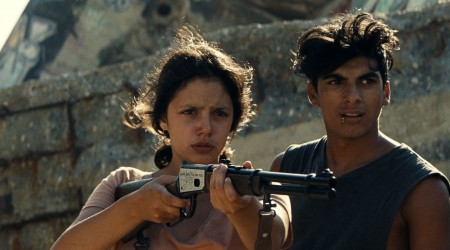
NOÉE ABITA AND JUAN CANO IN AVA
And original debut with a wild girl, going blind
The expansive mini-biography by Guy Bellinger in IMDb tells us a lot about the young Léa Mysius, who showed promise and daring with short films when quite young in film school; this is her feature debut. Mysius was born in Bordeaux and grew up in the Médoc where this film takes place, in the summer, full of beach and outdoor scenes, as if focuses on a 13-year-old girl who learns that she will soon lose her eyesight, and she and her mother determine to enjoy life to the fullest while the sight lasts. Mysius left this region at 13 herself (a kind of loss of sight?) with her parents and finished high school on the island of Reunion, then returning to France. Her companion Paul Guilhaume is the cinematographer for this film, as for a previous short film.
Ava is better at striking incidents and atmosphere than storyline, and there are lags and lulls in the action, even when he young heroine runs off and connects with Juan (Juan Caro), who is a dark local outcast from his family, or clan; is he Spanish, or a gypsy? There is a little of the Criminal Lovers vibe and I even thought of an old favorite of mine, Manual Pradal's beautiful, mythic 1997Marie Baie des Anges. What happened to the loss of eyesight? It's just a starting point, seemingly, to give the teenager's coming-of-age story a more intense edge. But the way that element comes and goes is another instance that Mysius is not ace at the writing.Vivid scenes - like the Spanish outdoor wedding, ending in a rainstorm, while Ava poses as a pardy hire to get his documents from his caravan and steal Juan's car for their, or his, escape - and saturated colors in 35mm. film, make this a kind of sensual pleasure. And the black dog and the dark-skinned boy and the nudity and the beaches and the blinding night-time: atmosphere, image prevail.
There is always an edge to the personalities, not only the wild Ava, but her immature mother, and the mysterious Juan. The film injects a mythic quality also with the two police on horseback who keep coming after Juan, like fascist guardians. The music is fine. This is indeed a most promising debut.
Ava, 105 mins, debuted at Cannes May 2017 in Critics Week, and showed in 17 other festivals. It opened in France in May 2017 and got good reviews (AlloCiné press rating 3.5). Télérama called it "a feast of the senses." Screened as part of the March 2018 New York Rendez-Vous with French Cinema at Lincoln Center, a joint production of the Film Society of Lincoln Center and UniFrance. Showtimes (Walter Reade heater):
March 11 8:30 PM
March 16 9:15 PM
Last edited by Chris Knipp; 03-08-2018 at 10:41 PM.
-
THE WORKSHOP/L'ATELIER (Laurent Cantet 2017)
LAURENT CANTET: THE WORKSHOP/L'ATELIER (2017)
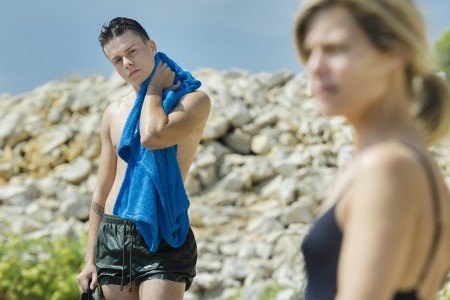
MATHIEU LUCCI, MARINA FOÏS IN THE WORKSHOP/L'ATELIER
Mysterious youth
Laurent Cantet's new film is part improvisational schoolroom study (like his prize-winning 2008 The Class), part slow-boiling (and slow-diffusing) thriller. Its themes, various and shifting, go back to social conflict and work, like his 1999 Human Resources and 2001 Time Out. They've also been updated and are as contemporary as Isis and the Bataclan massacre. This is a return to form and to collaboration with editor-cowriter Robin Campillo after two less successful projects by Cantet abroad on his own. The Workshop is alive and spontaneous yet easy-paced and very much a think piece. It leaves you pondering.
The focus is a summer writing workshop. A successful crime novelist, Olivia Dejazet (Marina Foïs), has come from her Parisian home base to the southern town of La Ciotat. The young students (all played by non-actors), who meet with her outdoors are a lively mix including white, black, Arab. The project is to invent collectively a novel that will later be published, the only requirement to make use of local setting and history. La Ciotat is a formerly great marine construction zone. It employed many workers, but most of it was shut down several decades ago, reduced to work on luxury yachts. The group agrees on a story about a mysterious death, presumably a murder.
They differ on the details. Malika (Warda Rammach) is focused on the great past of ship construction because her grandfather, an Arab from North Africa, established her family's French citizenship through honorable work there. She reads a nice text she's composed about the glory days and the shutdown. Several others, including the white French Benjamin (Julien Souve), here only a few years, don't relate to La Ciotat's history, the former glory, subsequent divorces and suicides and sense of disenfranchisement.
Overheard after the first class, the student-collaborators also set themselves off from Olivia, who of course is older, successful, in their eyes well-paid and supplied with a very nice house for the summer, most of all of another, privileged class, Parisian. They find her a little snobbish. One girl even says she has trouble understanding Olivia's Parisian French.
But whatever others say, control falls into the hands of one student, Antoine (Matthieu Lucci, riveting), who becomes the film's focus and pivot point. He doesn't talk much, but when he speaks, the effect is sly, disruptive, dismissive. In particular he riles the classmates of Arab background, linking them with Isis and the recent terrorist attacks in France. Eventually Antoine emerges not only as Olivia's main fascination, maybe the smartest, most talented class member, who yet abandons the class after reading two stunning texts. The first of these is a description of a mass murder by a disgruntled worker on a luxury yacht, which causes outrage and disruption among the others. The second, read as a parting shot, is about murder as an "acte gratuite" and is a stunning passage worthy of Camus' The Stranger. Through Antoine, the film also shifts from being about composing a thriller into perhaps becoming one.
As the POV shifts to Antoine, we see him much by himself - on afternoon swims, diving off the dramatic cliffs. At home he speaks little to his parents, does body building, admires his muscles, watches a right wing idealogue, plays video war games. It appears the video game that opened the film, its source unidentified, was his. He hangs out with a married cousin and a group of relatives and pals, they play night games with camouflaged faces and loaded pistols. He has stalked Olivia when she was visited by her editor, possibly lover. Later she electronically stalks him, tracking him to these activities through social media. There is something very contemporary about the incriminating digital trail Antoine has left. At the same time he likes kids and has a sweet smile, though in the classroom or in combative dialogue with Olivia it may start to look more like a smirk.
This last shift has been questioned by some as manipulative or simply tonally shaky - the joyous, chaotic action of The Class was nothing like this, where the "classroom" is open-air and shifting, the class is multicultural and differently committed, the subject matter itself uncertain. But it is saved by the cast. The other students never seem anything but authentic and alive. That "workshopping" of the film itself was extensive is shown in how each one is clearly established as an identity with a few deft touches.
None of this would work without the main actors, Marina Foïs and, especially, Matthieu Lucci, who is clearly a remarkable find. Foïs creates just the right mix of confidence, good will and insecurity in the face of multicultural working class youth. Lucci is a natural. The camera loves him. He makes Antoine preternaturally poised and mysterious. Perhaps everything Antoine is doing is playacting. His denial of political thoughts and claim to being "con" (stupid) are obvious lies. But are his nativism and racism deep convictions, or masks he's trying on? All is hidden behind the deeper mask of youth. What's behind the new muscles and fresh skin? Boredom, despair? Maybe it's just a phase he's going through, and we may hope that is true for the whole country, and for him.
Not all of this quite works. It may seem too calculatedly improvisational, tipped in for effect. But there's also a freedom about it - the surprise final sequence adds to that - that promises Cantet and Campillo (himself covered with glory as a director after Eastern Boys and his Cannes prizewinner BPM) - still have good things in store.
The Workshop/L'Atelier, 113 mins, debuted at Cannes in Un Certain Regard, showing or scheduled in 20 oher international festivals. It opened theatrically in France 11 Oct. 2017 (AlloCiné press rating a generally enthusiastic 3.9). US release (NYC) by Strand Releasing begins 23 Mar. 2018 in NYC at IFC Center. Previously included in the Mar. 8-18 Rendez-Vous with French Cinema at Lincoln Center.
Last edited by Chris Knipp; 03-22-2018 at 03:44 PM.
 Posting Permissions
Posting Permissions
- You may not post new threads
- You may not post replies
- You may not post attachments
- You may not edit your posts
-
Forum Rules





 Reply With Quote
Reply With Quote









Bookmarks